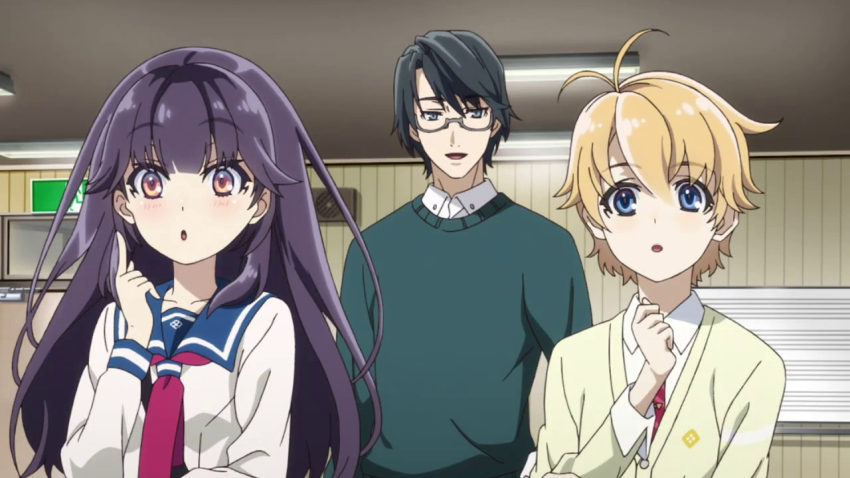Haruchika
January 24, 2020 · 0 comments
By Andrew Osmond.
 This blog has previously highlighted Japan’s love for mystery stories, and particularly for what the author P. D. James called the “amateur sleuth” tale, where the puzzle is tackled by a savant outside the police. Think of Holmes, Poirot, Marple or their descendants like Japan’s L or Sweden’s Lisbeth Salander. Haruchika is at the genre’s gentle end, but it still deals with some heavy-duty emotions. Its set-up is very like Kyoto Animation’s Hyouka, though the two shows develop in intriguingly different ways.
This blog has previously highlighted Japan’s love for mystery stories, and particularly for what the author P. D. James called the “amateur sleuth” tale, where the puzzle is tackled by a savant outside the police. Think of Holmes, Poirot, Marple or their descendants like Japan’s L or Sweden’s Lisbeth Salander. Haruchika is at the genre’s gentle end, but it still deals with some heavy-duty emotions. Its set-up is very like Kyoto Animation’s Hyouka, though the two shows develop in intriguingly different ways.
As in Hyouka, the amateur sleuth of Haruchika is an unassuming, soft-spoken schoolboy, named Haruta Kamijo. Also like Hyouka, the Watson character is a girl student, Chika (hence the series’ Brangelina title). At first their relationship seems like the anime archetype. Haru and Chika used to be neighbours and sandbox playmates, though it’s made amusingly clear that Haruta doesn’t have rose-tinted memories of their childhood, but rather remembers a tomboy girl who always made him cry.
Right from the start, Haruchika is interested in the differences between appearance and reality, even in the most ordinary people. The opening episode stresses how Chika has decided to “make over” her personality, changing her image from a hard-practicing volleyball powerhouse to the kind of cute, genteel girl who can join a school music club. Indeed, Chika does join the music brass band club, where she finds that Haruta is already a member of it. To her dismay, he looks as cute as she does, possibly cuter, and his attitude still brings out the tomboy in her.
 The fact that the story centres on a brass band club, which is taught by a good-looking teacher in his twenties, will instantly remind some viewers of another Kyoto Animation anime, Sound! Euphonium. I should clarify that Haruchika is much more of a mystery-puzzle series than it is a music drama, though the musical element is used to illustrate the characters’ progression. Chika slowly improves with her chosen instrument (a flute), and the initially tiny club grows steadily, with several recruits being characters who Haruta and Chika help during the series. Other school clubs play a part as well; we’re shown they’re all competing for funds and facilities.
The fact that the story centres on a brass band club, which is taught by a good-looking teacher in his twenties, will instantly remind some viewers of another Kyoto Animation anime, Sound! Euphonium. I should clarify that Haruchika is much more of a mystery-puzzle series than it is a music drama, though the musical element is used to illustrate the characters’ progression. Chika slowly improves with her chosen instrument (a flute), and the initially tiny club grows steadily, with several recruits being characters who Haruta and Chika help during the series. Other school clubs play a part as well; we’re shown they’re all competing for funds and facilities.
You may watch the first episode thinking Haruchika is just copying Hyouka and umpteen other school anime… until the end of the episode, that is, when there’s a big surprise involving one of the leads. We won’t give it away, but it changes the dynamic between Haruta and Chika into something a lot less typical… though the show has much of the familiar humour and cuteness of those aforementioned school anime.
But Haruchika also has an unusually strong ethos. The mysteries and puzzles that Haruta and Chika explore are diverse and intriguing, bringing up a range of cultural references, from the musical riddles of Bach to the Victorian literature of Rudyard Kipling. The puzzles also deal boldly with contentious real issues, from the legacy of Vietnam, to Japan’s problem of hikkikomori shut-ins, to China’s one-child policy.
But what Haruchika stresses is that these puzzles involve characters who are emotionally distressed or damaged. In solving their problems, Haruta is presented overtly as their healer. This is a common thread in detective fiction, but it’s often played down, overshadowed by other elements; for example, Hyouka preferred to highlight the shy chemistry between its young investigators. Haruchika, though, puts the healing element front and centre – especially in an episode about a mysterious radio station where Haruta discovers other healers, who are also listening to people and helping them in indirect but vital ways.
This ethos goes back a long way in detective fiction. The literary critic John Carey suggested that Sherlock Holmes (the Doyle original) was almost a Christ-like figure in divining people’s souls through deduction and reminding them that they’re individuals who matter.
Like Hyouka, Haruchika is based on a book series, in this case by Sei Hatsuno. Also like Hyouka, the property has been turned not just into anime but also manga and a live-action film. The Haruchika anime is produced by P.A. Works (Maquia), but it’s only a small degree of separation from Kyoto Animation. Haruchika’s female scriptwriter is the prolific Reiko Yoshida, whose credits stretch from Cat Returns to Lu Over the Wall, but who’s especially associated with the Kyoto studio. Yoshida was the lead writer on K-ON!, Tamako Market and Violet Evergarden; she also scripted A Silent Voice and Liz and the Blue Bird.
Haruchika is streaming in the UK on FunimationNow.
Leave a Reply